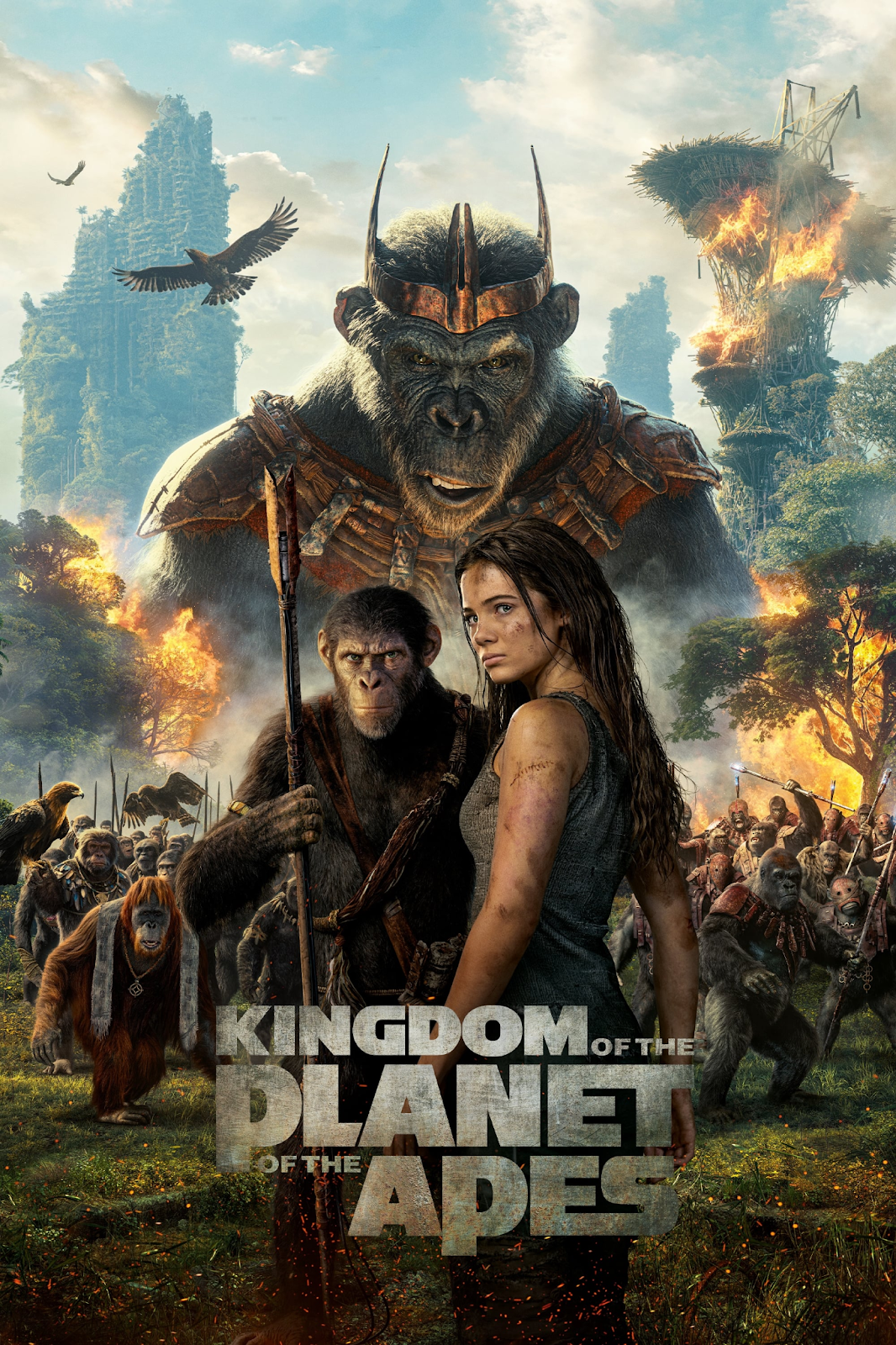The "Planet of the Apes" franchise has long captivated audiences with its compelling blend of science fiction, social commentary, and unforgettable storytelling. Since its inception in 1968, the series has explored the complexities of civilization, the consequences of human hubris, and the intriguing possibilities of a world where apes rule over humans. As we step into 2024, the saga continues with "Kingdom of the Planet of the Apes," a film that promises to be a bold new chapter in this iconic narrative.
With this latest installment, the franchise seeks to expand its horizons, delving deeper into the richly imagined post-apocalyptic world where apes have ascended to dominance. Directed by a visionary filmmaker and featuring a stellar cast, "Kingdom of the Planet of the Apes" aims to push the boundaries of visual effects and storytelling, while staying true to the profound themes that have always been at the heart of the series.
In this article, we will take you through everything you need to know about "Kingdom of the Planet of the Apes." From its gripping plot and nuanced characters to the cutting-edge technology behind its stunning visuals, we'll explore how this film fits into the broader legacy of the franchise. Whether you're a long-time fan or a newcomer curious about the world of the apes, join us as we journey into this latest cinematic adventure.
Background of the Franchise
The "Planet of the Apes" franchise has a storied history that spans over half a century, beginning with its groundbreaking debut in 1968. Based on Pierre Boulle's novel "La Planète des Singes," the original film directed by Franklin J. Schaffner introduced audiences to a dystopian future where apes have evolved into the dominant species on Earth, and humans are reduced to mute subservience. This film not only captivated viewers with its imaginative concept and striking visuals but also left a lasting impact with its shocking twist ending and profound social commentary.
{/* */}The success of the original "Planet of the Apes" spawned a series of sequels in the 1970s, including "Beneath the Planet of the Apes," "Escape from the Planet of the Apes," "Conquest of the Planet of the Apes," and "Battle for the Planet of the Apes." Each film added new layers to the overarching narrative, exploring themes of rebellion, survival, and the cyclical nature of history. Despite varying critical reception, these films cemented the franchise's place in popular culture.
The franchise underwent a revival in the 2000s, starting with Tim Burton's 2001 reimagining. However, it was the 2011 reboot, "Rise of the Planet of the Apes," that truly revitalized the series. Directed by Rupert Wyatt, the film introduced a new origin story that began with a genetically enhanced chimpanzee named Caesar, portrayed by Andy Serkis through groundbreaking motion-capture technology. This film, along with its sequels "Dawn of the Planet of the Apes" (2014) and "War for the Planet of the Apes" (2017), directed by Matt Reeves, received critical acclaim for their sophisticated storytelling, emotional depth, and impressive visual effects.
The reboot trilogy explored the rise of ape intelligence and the eventual downfall of human civilization, setting the stage for the apes' ascendance. These films not only resonated with longtime fans but also garnered a new generation of followers, thanks to their thoughtful exploration of themes such as empathy, leadership, and the ethics of scientific experimentation.
As we approach the release of "Kingdom of the Planet of the Apes" in 2024, the franchise continues to evolve, promising to expand its rich narrative universe even further. This latest chapter aims to build on the legacy of its predecessors while pushing the boundaries of cinematic storytelling and visual innovation.
Plot Synopsis
Set in a future where apes have become the dominant species, "Kingdom of the Planet of the Apes" continues the story several years after the events of "War for the Planet of the Apes." In this new world, apes have established their own societies, with different factions vying for power and survival. The film follows a young, intelligent ape named Alaric, who rises to leadership amidst growing tensions between rival ape tribes and the remnants of the human population.
The central plot revolves around Alaric’s quest to unite the ape tribes against a common threat posed by a group of surviving humans who have discovered a way to weaponize the virus that initially gave apes their intelligence. As Alaric navigates the political landscape of ape society, he must also confront his own beliefs about coexistence and leadership. Themes of unity, trust, and the struggle for peace are woven into a narrative that is as thought-provoking as it is thrilling.
Characters and Cast
- **Alaric**: The protagonist, a young and visionary leader among the apes, portrayed by an acclaimed actor known for their dynamic performances. - **Zara**: A wise and strategic advisor to Alaric, played by an actress renowned for her roles in dramatic and action films. - **Koba**: A rival leader with a fierce and militant approach, named in homage to the character from the previous films, but representing a new generation. - **Dr. Ellis**: The antagonist, a human scientist determined to use the virus to reclaim human dominance, portrayed by a seasoned actor with a history of compelling villain roles.
The cast features a blend of new talent and veteran actors, all bringing depth and nuance to their roles. Motion-capture technology continues to play a pivotal role, allowing for highly expressive and realistic performances from the ape characters.
Production and Direction
Directed by a visionary filmmaker with a fresh perspective on the franchise, "Kingdom of the Planet of the Apes" aims to blend epic storytelling with intimate character development. The production team includes experienced writers and producers who have been integral to the success of previous installments.
The film was shot in diverse locations to create a richly detailed post-apocalyptic world. The director’s approach focuses on blending practical effects with cutting-edge CGI, ensuring a visually stunning experience that feels both grand and grounded.
Visual Effects and Technology
"Kingdom of the Planet of the Apes" continues the franchise’s tradition of pioneering visual effects. The use of advanced motion-capture technology allows actors to deliver emotionally resonant performances, while the digital artists create lifelike apes that interact seamlessly with their environment. The film's visual effects team has built upon the techniques used in the previous trilogy, incorporating the latest advancements in CGI to enhance the realism of both the apes and the world they inhabit. This installment promises to be a visual spectacle, with meticulously crafted scenes that push the boundaries of what is possible in modern filmmaking.
Reception and Expectations
Even before its release, "Kingdom of the Planet of the Apes" has generated significant buzz. Early trailers and promotional material have been met with enthusiasm from fans and critics alike, eager to see how the story evolves. Expectations are high, with many anticipating another critical and commercial success for the franchise
Pre-release reviews highlight the film’s strong performances, compelling story, and impressive visual effects. Box office predictions are optimistic, with industry analysts forecasting a robust opening weekend.
Themes and Symbolism
"Kingdom of the Planet of the Apes" delves into themes of leadership, unity, and the quest for peace in a fractured world. The film explores the challenges of building a cohesive society amidst diversity and conflict, reflecting contemporary issues of governance and cooperation.
Symbolism is richly woven into the narrative, with apes representing different facets of society and human characters embodying various responses to change and adversity. The film’s exploration of power dynamics and ethical dilemmas offers a thought-provoking commentary on our own world.
Future of the Franchise
As "Kingdom of the Planet of the Apes" opens a new chapter, speculation about the future of the franchise abounds. Potential sequels could further explore the evolving relationship between apes and humans, delve into the history of the virus, or introduce new species into the narrative. The enduring appeal of the "Planet of the Apes" series lies in its ability to adapt and resonate with each new generation. Whether through continued exploration of its rich themes or innovative storytelling, the franchise is poised to remain a significant part of cinematic history for years to come.
"Kingdom of the Planet of the Apes" stands as a testament to the enduring legacy and innovative spirit of this iconic franchise. With its compelling plot, richly drawn characters, and groundbreaking visual effects, the film promises to captivate both long-time fans and newcomers alike. As we await its release, the anticipation is a reminder of the powerful storytelling that has made the "Planet of the Apes" series a cornerstone of science fiction cinema. Be sure to watch the film and share your thoughts on this exciting new chapter in the comments below.






